|
|
|
Sort Order |
|
|
|
Items / Page
|
|
|
|
|
|
|
| Srl | Item |
| 1 |
ID:
160977


|
|
|
|
|
| Summary/Abstract |
This study centers on the relation between militaries, violence, and publicly available digital images. Military websites can be characterized as forms of representation of national institutions comparable to the sites of any large organization. However, the way these websites publicly frame and explain the military’s use of organized violence has not been investigated. Accordingly, this study examines how contemporary militaries manage their public and online relation to their core expertise, organized violence. The analysis is based on a longitudinal analysis of the Israeli Defense Force’s (IDF) official websites (2007–2015) and interviews with key webmasters. The integration of the Internet and new media into the IDF’s official websites highlights its deliberate move into the cybernetic realm to manage, order, manipulate, and handle its public images and representations as a legitimate social institution charged with using violence in the defense of the country.
|
|
|
|
|
|
|
|
|
|
|
|
|
|
|
|
| 2 |
ID:
163813
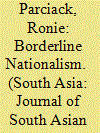

|
|
|
|
|
| Summary/Abstract |
The daily ‘Retreat Ceremony’ held at the Wagah–Attari border between Pakistan and India evokes questions regarding Indo–Pak relations, their public display and the dynamic mix of hostility versus reciprocal collaboration the ceremony demonstrates. Over the past couple of years, the Indian border zone at Attari has undergone major changes affecting both its spatial design and commerce in the local bazaars. Between 2011 and 2015, video compact discs sold there, including some produced by the Indian Border Security Force, expressed a desire to eradicate the India–Pakistan border and unite the two states; these discs disappeared in 2015. However, the Indian desire to see the nation and its borders as partially permeable has not disappeared. This essay addresses the commercial products available at the border-zone area, as well as political changes in India, physical transformations at the Indian border zone, and new practices in the ceremony itself, supporting the idea that the border is an arena that reveals a certain porousness and fragility of the nation.
|
|
|
|
|
|
|
|
|
|
|
|
|
|
|
|
| 3 |
ID:
139639
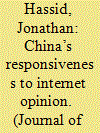

|
|
|
|
|
| Summary/Abstract |
Despite its authoritarian bent, the Chinese government quickly and actively moves to respond to public pressure over misdeeds revealed and discussed on the internet. Netizens have reacted with dismay to news about natural and man-made disasters, official corruption, abuse of the legal system and other prominent issues. Yet in spite of the sensitivity of such topics and the persistence of China’s censorship apparatus, Beijing usually acts to quickly address these problems rather than sweeping them under the rug. This paper discusses the implications of China’s responsiveness to online opinion. While the advantages of a responsive government are clear, there are also potential dangers lurking in Beijing’s quickness to be swayed by online mass opinion. First, online opinion makers are demographically skewed toward the relative “winners” in China’s economic reforms, a process that creates short-term stability but potentially ensures that in the long run the concerns of less fortunate citizens are ignored. And, second, the increasing power of internet commentary risks warping the slow, fitful – but genuine – progress that China has made in recent years toward reforming its political and legal systems.
|
|
|
|
|
|
|
|
|
|
|
|
|
|
|
|
| 4 |
ID:
145635
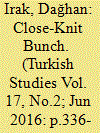

|
|
|
|
|
| Summary/Abstract |
Through the 13-year period of Justice and Development Party (AKP) governments, the party has developed its own economic and social network, which has created a dominant-party system with hegemonic tendencies. The creation of a pro-government media has constituted the cultural aspect of this transformation, as many mainstream media outlets have been seized by the government and sold to pro-AKP business ventures. Moreover, the state-run media Turkish Radio and Television (TRT) and Anadolu Agency (AA) companies have been subsidized and restructured in line with the government agenda. These public news producers, especially during the most recent term of the AKP government, have been controlled by officials from a small network close to the party leadership. This study explores the political concentration in Turkey's public media by means of an analysis of the Twitter interactions of AA board members, between August 2011 and February 2015.
|
|
|
|
|
|
|
|
|
|
|
|
|
|
|
|
| 5 |
ID:
114952
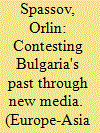

|
|
|
|
|
| Publication |
2012.
|
| Summary/Abstract |
This essay investigates the conflict between two different ways of writing in Bulgarian on the web: using the standard Cyrillic alphabet and using the Latin script. Initially, the reason for using the Latin script was purely technical: the absence of appropriate software for decoding Cyrillic fonts. However, the Latin script remained popular even after the encoding problems were solved, acquiring new ideological meanings and provoking political controversies. This essay discusses the subcultural, cultural and political consequences of these developments.
|
|
|
|
|
|
|
|
|
|
|
|
|
|
|
|
| 6 |
ID:
114956


|
|
|
|
|
| Publication |
2012.
|
| Summary/Abstract |
The expansion of new media and the advent of Web 2.0 has resulted in dramatic changes in consumers' roles, turning them into 'prosumers': co-participants in cultural production. This essay considers the new situation through analysis of transmedia phenomena produced simultaneously by companies and consumers' activity. The analysis of two Russian transmedial projects: S.T.A.L.K.E.R. and Metro 2033, reveals a paradox in this phenomenon testifying to the mass expansion and boom in creative practices (rooted, to a great extent, in Soviet cultural traditions) and to their total commodification at the same time.
|
|
|
|
|
|
|
|
|
|
|
|
|
|
|
|
| 7 |
ID:
168174
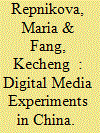

|
|
|
|
|
| Summary/Abstract |
With the rapid decline of traditional media in China, the party-state faces the growing challenge of shaping public opinion online. This article engages with one response to this challenge – a state-sanctioned digital media experiment aimed at creating a new form of journalism that appeals to the public and helps to disseminate Party propaganda. We analyse the emergence of a national success story, Shanghai-based model media outlet Pengpai, and its diffusion across different regions. We argue that the synergy between local officials and media entrepreneurs has propelled Pengpai’s national fame. We further demonstrate that while there has been a cross-national attempt to diffuse this model, it has produced mixed results owing to a number of factors, including the superficial commitment of local officials and media professionals. These findings demonstrate that state-sanctioned decentralized experimentation can deliver unpredictable results in the sphere of media policy, and they further question the capacity of the party-state to effectively reinvent public persuasion in the digital age.
|
|
|
|
|
|
|
|
|
|
|
|
|
|
|
|
| 8 |
ID:
127471
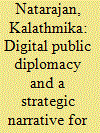

|
|
|
|
|
| Publication |
2014.
|
| Summary/Abstract |
States articulate their identity and foreign policy interests in the international system, seeking to influence the perceptions of others and to create an environment in which their goals and efficacy as an actor are viewed as legitimate. In the age of mass communication technologies and new media, the public diplomacy initiatives utilised to communicate these narratives have gone digital. This article studies how India has utilised this new media environment for its public diplomacy and argues that digital diplomacy should be conceptualised as a larger set of practices that form an integral part of diplomacy itself: to communicate foreign policy goals and decisions, construct a strategic narrative of Indian foreign policy and counter narratives inimical to Indian interests.
|
|
|
|
|
|
|
|
|
|
|
|
|
|
|
|
| 9 |
ID:
102459
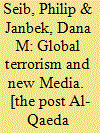

|
|
|
|
|
| Publication |
London, Routledge, 2011.
|
| Description |
xii, 139p.
|
| Standard Number |
9780415779623, hbk
|
|
|
|
|
|
|
|
|
|
|
|
Copies: C:1/I:0,R:0,Q:0
Circulation
| Accession# | Call# | Current Location | Status | Policy | Location |
| 055855 | 363.325/SEI 055855 | Main | On Shelf | General | |
|
|
|
|
| 10 |
ID:
122398
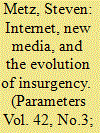

|
|
|
|
|
| Publication |
2012.
|
| Summary/Abstract |
I
nsurgency, like war, has an enduring nature and a changing character. It
remains a strategy entailing violence used by the weak and desperate against
a power system.1
Often (but not always), this pits a nonstate or proto-state organization against a state. Out of weakness, the organization using a strategy of
insurgency attempts to shift the focus of conflict away from domains where the
state or other power structure is particularly strong, particularly the conventional military. Insurgents seek to make domains decisive where morale and
other psychological characteristics matter more than tangible power, recognizing these characteristics even the odds to a certain extent. The enduring nature
of insurgency includes three core functions: an insurgency must survive, it must
strengthen itself, and it must weaken the power structure or state.
|
|
|
|
|
|
|
|
|
|
|
|
|
|
|
|
| 11 |
ID:
114955
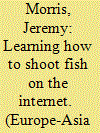

|
|
|
|
|
| Publication |
2012.
|
| Summary/Abstract |
This essay examines regimes of internet use, and the significance of the internet for everyday lives, in the Russian margins. The field site, a small provincial town in European Russia, was visited in 2009 and 2010. Informants were mainly families dependent on a single non-professional wage. Research materials-semi-structured interviews and participant observation-comprising an ethnography of internet use, are supplemented by survey data. Qualitative social research on new media use has critically examined technologically determinist assumptions about social effects of the internet, including the so-called 'digital divide'. The present research also seeks a contextualised understanding of new media use by considering how it is embedded in established everyday social settings and practices. The ethnographic materials and survey data collected indicate that Woolgar's rules of virtuality hold true in the Russian margins: use of new media depends on the local social context and supplements, rather than replaces real activities. Most users in the group surveyed are highly instrumentalist and have little interest in the communicative and non-grounded aspects of the media. At the same time the impetus for initial access to the internet is closely related to issues of esteem and peer recognition within a social network rather than actual need.
|
|
|
|
|
|
|
|
|
|
|
|
|
|
|
|
| 12 |
ID:
090237


|
|
|
|
|
| Publication |
2009.
|
| Summary/Abstract |
Just as radio and television revolutionized the presidential election process in earlier decades, today the "new media" are making a significant imprint on how campaigns are conducted by candidates, covered by journalists, and evaluated by the voters. While the same basic goals for campaigns apply, the tools to accomplish these goals have expanded.
|
|
|
|
|
|
|
|
|
|
|
|
|
|
|
|
| 13 |
ID:
113718


|
|
|
|
|
| Publication |
2012.
|
| Summary/Abstract |
The Malaysian general elections held on 8 March 2008 proved to be a historic event. For the first time, the political opposition managed to deny the incumbent National Front coalition a two-thirds parliamentary majority. Attempts to explain the opposition coalition's 2008 success have identified new media as a critical factor that turned the tide in the opposition's favour. The purpose of this paper is to better understand the new media factor at the 2008 elections and its immediate aftermath by analysing its role, advantages proffered, and limitations in terms of advancing democratization and greater political openness in Malaysia.
|
|
|
|
|
|
|
|
|
|
|
|
|
|
|
|
| 14 |
ID:
167103


|
|
|
|
|
| Summary/Abstract |
This paper departs from the analytic lens of citizen versus the state and brings to attention intra-bureaucratic interactions in the wake of Aadhaar by focusing on the ongoing implementation of an Aadhaar Enabled Biometric Attendance System (AEBAS). Based on ethnographic research in a North Indian state, I show how AEBAS’ goals of performance evaluation and management were partially, and unintentionally, circumvented by staff members, in part owing to the socio-technical design of the system. I argue that an unintended consequence of projects using digital media technologies to quantify and manage performance is their tendency to produce a performance of management, and that scholars and activists must pay attention to such disjunctures inherent in projects of command and control.
|
|
|
|
|
|
|
|
|
|
|
|
|
|
|
|
| 15 |
ID:
106310
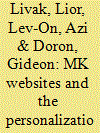

|
|
|
|
|
| Publication |
2011.
|
| Summary/Abstract |
The article explores the contribution of MKs' websites to political personalization by addressing three questions. Is it more likely that MKs who belong to parties that conduct primaries will establish a website than MKs who belong to parties which select their candidates in a more centralized fashion? Are MKs' websites richer, more interactive and more frequently updated than their respective party's websites? Finally, do MKs link their websites to the websites of their parties? We find some evidence that MKs' personal websites further support and enhance the personalization of Israeli politics.
|
|
|
|
|
|
|
|
|
|
|
|
|
|
|
|
| 16 |
ID:
148127


|
|
|
|
|
| Summary/Abstract |
After the ‘CNN effect’ concept was coined two decades ago, it quickly became a popular shorthand to understand media-conflict interactions. Although the connection has probably always been more complex than what was captured in the concept, research needs to be updated in order to better understand the multifaceted contemporary environments of both media and conflict. There are growing numbers and types of media sources, and multiple interactions between media and conflict actors, policymakers and engaged publics from the local to the global and back. We argue that understanding the impact of media reporting on conflict requires a new framework that captures the multilevel and hybrid media environments of contemporary conflicts. This study provides a roadmap of how to systematically unpack this environment. It describes and explains how different levels, interactions, and forms of news reporting shape conflicts and peacebuilding in local, national and regional contexts, and how international responses interact with multiple media narratives. With these tools, comprehensive understandings of contemporary local to global media interactions can be incorporated into new research on media and conflict.
|
|
|
|
|
|
|
|
|
|
|
|
|
|
|
|
| 17 |
ID:
114946
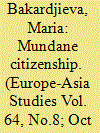

|
|
|
|
|
| Publication |
2012.
|
| Summary/Abstract |
This essay examines the new forms of civic and political engagement that the increasing accessibility of internet-based media has precipitated in the Bulgarian context. It discusses the results of three case studies which focus respectively on online forum discussions of a significant political event; a campaign of eco-protests; and the activism emerging from a website and forum dedicated to motherhood. The essay argues that new media have brought civic and political issues and the possibility to deliberate and act on them into the everyday lives of Bulgarians. As a result, the voice of Bulgarian civil society has grown stronger and has been able to penetrate the sphere of formal politics, sometimes with important consequences.
|
|
|
|
|
|
|
|
|
|
|
|
|
|
|
|
| 18 |
ID:
187369


|
|
|
|
|
| Summary/Abstract |
The environmental sector is an interesting realm in Chinese politics to observe factors such as the contributions of new media activism in bottom-up communication and decision-making processes, especially during the 40 years of reform and opening up. Top-down efforts to curb environmental issues are primarily to address increasing pubic discomfort due to pollution and related problems. However, environmental movements are increasingly visible in China despite their application of stability maintenance mechanisms such as Environmental Police. It is therefore noteworthy to deeply analyse the factors that contribute to the increasing scale of movements in the country. This study examines the role of new media activism (occurring due to the public’s interactions through WeChat, Weibo, QQ, etc.) in shaping the trajectory of environmental movements in China. How are these avenues supporting alternative communication channels outside the mainstream policy making apparatus? Is the government willing to incorporate the interests developed in these channels to policymaking realms? How these behavioural changes are influencing the state–society relations in contemporary China in the context of increasing environmental concerns. The study employs agency-structure framework to analyse the interactions between new media activism and the single party ruling political structure with the support fieldwork data from China. The study examines policy documents, official declarations of the communist party, public attitude towards new media activism, and so on, in order to present a comprehensive understanding on the politics of ecology in the PRC.
|
|
|
|
|
|
|
|
|
|
|
|
|
|
|
|
| 19 |
ID:
118788


|
|
|
| 20 |
ID:
114945


|
|
|
|
|
|
|
|